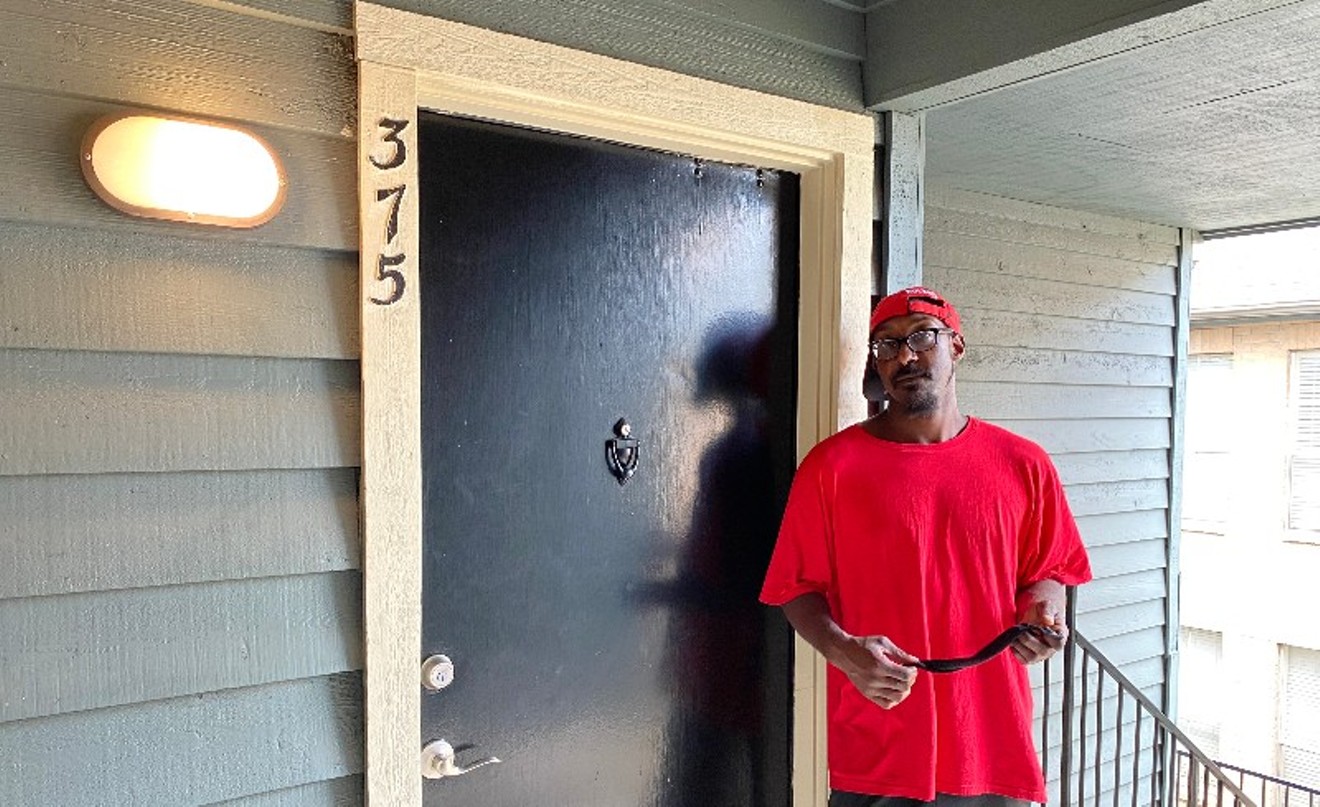In the middle of a pandemic, Maurice Barksdale had nowhere to stay.
A 38-year-old Philadelphia native, Barksdale took his father up on an offer to move down to live with him in Texas in February after Barksdale’s mother passed away two months prior. Barksdale stayed with his dad in a senior citizen’s community in Jacinto City just east of Houston for several months, but when the two had a falling out in early June, Barksdale was kicked out of the facility. He was already unemployed, and was now officially homeless.
“I slept in the park a couple nights,” Barksdale said, because he knew there was an electrical outlet there he could use to charge his phone to make sure he didn’t miss a call from one of the potential employers he was waiting to hear from. After a few nights sleeping in the sweltering summer heat, Barksdale called the Salvation Army, the international Christian charity that operates multiple homeless shelters in and around Houston. When he was told the Center of Hope shelter for single men on Congress Street downtown had a bed available, he said he’d be there as quickly as he could.
Despite some initial hesitation about moving into a residential homeless shelter while a highly-transmissible disease was still spreading every day, Barksdale was out of options, so he took a leap of faith.
“I was a little skeptical, but you know, I left it in the Almighty’s hands,” he said.
A couple of weeks after he moved into the Center of Hope shelter, Barksdale had secured a job at the Dr. Pepper warehouse in south Houston. He saved his money for the next several weeks, and was able to move into an apartment of his own on August 13, within walking distance of his new job.
Houston area shelters provide a lifeline for the many men and women like Barksdale who either don’t have a place of their own or have had to leave home for a variety of reasons including domestic violence, and their work has continued despite the pandemic. The realities of COVID-19 have forced these organizations to think creatively and significantly alter their operations, as the problem of a potentially deadly disease that spreads easily between people poses unique challenges to residential shelters.
The largest residential homeless shelter organization in Houston is Star of Hope, a Christian charity that offers a variety of supportive services to people experiencing homelessness, primarily through its Doris and Carlos Morris Men’s Development Center in downtown Houston and its Women and Family Development Center just south of the Inner Loop.
Before the pandemic, Star of Hope shelters typically housed “more than 1,000 men, women and children” on any given night according to a statement from Star of Hope President and CEO Hank Rush posted to the organization’s website. Star of Hope declined an interview request from the Houston Press for this story, but a spokesperson said in a statement that its two main shelters “are constantly serving at capacity, while continuing to follow state, local, and CDC guidelines.”
Back in May, KHOU reported on a coronavirus outbreak within Star of Hope’s Men’s Development Center, which resulted in 69 residents and eight staff members testing positive for COVID-19. After that outbreak was discovered, the shelter worked with the City of Houston to quarantine residents in a local hotel that the City of Houston and Harris County jointly contracted with to provide a safe place to isolate homeless area residents who either have COVID-19 or have come into contact with someone who tested positive.
The Salvation Army of Greater Houston is the next largest homeless shelter operator in the Houston area after Star of Hope. Their main local shelters are the Center of Hope for single men and the Jones Residence, which houses single women and families. In addition to these two residential shelters, the City of Houston recruited the Salvation Army to operate a new overflow shelter out of the Fonde Community Center just northeast of downtown starting back in April. This facility was created to provide a space for other local shelters to send clients in order to reduce the number of homeless individuals staying in a given shelter in order to better comply with social distancing guidelines from the CDC.
Between their two main residential shelters and the Fonde overflow facility, the Salvation Army has provided 20,500 nights of shelter to individuals experiencing homelessness in and around Houston since Harris County Judge Lina Hidalgo issued the first countywide stay home order in late March. “That’s really about half of what we normally would do,” said Zach Bell, Salvation Army of Greater Houston’s Area Commander.
In order to meet the CDC’s recommendations on social distancing, Bell said The Salvation Army is currently operating shelters at 50 percent capacity. Between all of its residential shelters, the nonprofit can currently serve up to 288 people while still adhering to social distancing guidelines.
The Houston Area Women’s Center, one of Houston’s largest residential shelters for women and children who are survivors of domestic and sexual violence, has also seen its work affected by COVID-19. To reduce the number of people in its main campus shelter — which is operating at a maximum occupancy of 75, down from 120 pre-pandemic — HAWC struck a deal with multiple local hotels to provide ample extra space to spread out their clients.
HAWC’s hotline for women who are trying to get out of an abusive environment has been busier than usual during the pandemic. “We have seen both an increase in calls, but maybe more importantly, we’ve seen an increase in the complexity and severity of the needs,” said Emilee Whitehurst, HAWC’s President and CEO.
From April through June of 2020, HAWC’s hotline received 11,014 calls, which was 752 more calls than came in during the same period last year. Whitehurst believes that the influx of violence victims reaching out for help during the pandemic is tied to the combined stress of living under near-lockdown conditions and from the economic hardship people are facing due to COVID-19. “We don’t consider those things as root causes of domestic abuse, but we certainly know, and evidence shows, that it escalates violence,” Whithurst said.
HAWC had a crisis on its hands in early July, when the shelter experienced a coronavirus outbreak of its own that saw 13 clients — six women and seven children — and 12 staff members test positive for COVID-19. HAWC ended up shifting all of its clients who had not tested positive to their “HAWC Hotel” facilities and used its main campus to quarantine clients who tested positive. As of Friday, only six clients — three women and three children — and three staff members were still under quarantine, said Chau Nguyen, HAWC’s Chief Public Strategies Officer.
In addition to significantly increasing sanitation efforts and providing personal protective equipment like masks and face shields to frontline staff, one of the main operational shifts both the Salvation Army and HAWC have made during the pandemic is moving away from face-to-face case management services. “Since COVID, we’ve done over 5,300 appointments where we’ve done case management over phone or over Zoom, which would traditionally be in person,” Bell said. “Even with clients who are residing on campus, or in the HAWC Hotel, we’re doing telephone counseling, or if they want, virtual counseling,” said Whitehurst.
The Salvation Army takes the temperature of everyone who enters one of its facilities and asks each person if they are experiencing COVID-19 symptoms. If a client is flagged through that process, that person is then referred to a dedicated COVID-19 testing program for homeless individuals operated by the Harris Health System’s Healthcare for the Homeless initiative. A spokesperson from the Salvation Army told the Houston Press they could not provide statistics on exactly how many clients and staff members have tested positive for COVID-19 “due to strict client confidentiality policies.”
Marc Eichenbaum, Special Assistant to the Mayor for Homeless Initiatives, said that 200 homeless individuals have been sent to the joint quarantine hotel facility operated by the city and Harris County over the course of the pandemic, but said the city does not have a specific breakdown of how many of those individuals were confirmed positive COVID-19 patients or were simply being quarantined as a precautionary measure. In early June, a baseline COVID-19 testing program managed by the Houston Health Department and Harris County Public Health tested 868 shelter residents across all of the Houston area’s homeless shelters, and 176 residents tested positive, Eichenbaum said.
As of Tuesday, there were at least 475 individuals staying in residential homeless shelters between Harris County and Fort Bend County — an increase of 18 from June’s total — according to data from Houston's Coalition for the Homeless. The current tally represents a sharp decline from the 735 clients who were counted as shelter residents prior to the pandemic in February. However, Eichenbaum explained that these statistics don't include the residents of Star of Hope's Women and Family Development Center because that facility doesn't use the same Coalition-provided computerized tracking system as the rest of the region's homeless shelters. The most recently available data from that shelter showed a total of 372 residents for the month of July.
Eichenbaum said that the Mayor’s Office for Homeless Initiatives is working with Healthcare for the Homeless on a “sustainable, long-term testing program” for Houston area homeless shelters that’s tentatively set to start "at the beginning of September.” Under this new program, a limited random sample of both clients and staff at each local homeless shelter would be tested “every other week,” Eichenbaum said, and if a single person from that shelter’s sample tests positive, all staff and clients would then be tested.
Both Bell and Whitehurst said they understand why people in need of shelter might be nervous about staying at a communal residential facility in the middle of a pandemic, but wanted to assure their potential clients that their organizations are doing everything they can to keep people safe. “If people are in an unsafe situation, then the shelter that we would offer would be a much better situation,” Whitehurst stressed.
“We do acknowledge that even with the greatest precautions, things can happen, but there’s also systems in place to make sure that people’s needs are met,” Bell said.
Barksdale said he was impressed with the precautions that the Salvation Army took to keep clients like him safe from COVID-19 during his stay at the Center of Hope. When he arrived, he was initially quarantined in his own room for two weeks to make sure he didn’t develop any coronavirus symptoms. Two weeks before he left, Barksdale was tested for COVID-19 at the shelter.
“I was negative for the virus. They came right on-site and tested you right there, so they have safeguards,” he said. "I would definitely recommend it to anyone."
Support Us
Houston's independent source of
local news and culture
account
- Welcome,
Insider - Login
- My Account
- My Newsletters
- Contribute
- Contact Us
- Sign out
Houston Shelters Are Still Providing Refuge Despite the Pandemic
Schaefer Edwards August 20, 2020 4:00AM

Maurice Barksdale stood proudly outside his new apartment, just days after leaving the Salvation Army homeless shelter he lived in for weeks during the pandemic.
Photo by Schaefer Edwards
[
{
"name": "Related Stories / Support Us Combo",
"component": "11591218",
"insertPoint": "4",
"requiredCountToDisplay": "4"
},{
"name": "Air - Billboard - Inline Content",
"component": "11591214",
"insertPoint": "2/3",
"requiredCountToDisplay": "7"
},{
"name": "R1 - Beta - Mobile Only",
"component": "12287027",
"insertPoint": "8",
"requiredCountToDisplay": "8"
},{
"name": "Air - MediumRectangle - Inline Content - Mobile Display Size 2",
"component": "11591215",
"insertPoint": "12",
"requiredCountToDisplay": "12"
},{
"name": "Air - MediumRectangle - Inline Content - Mobile Display Size 2",
"component": "11591215",
"insertPoint": "4th",
"startingPoint": "16",
"requiredCountToDisplay": "12"
}
,{
"name": "RevContent - In Article",
"component": "12527128",
"insertPoint": "3/5",
"requiredCountToDisplay": "5"
}
]
KEEP THE HOUSTON PRESS FREE...
Since we started the Houston Press, it has been defined as the free, independent voice of Houston, and we'd like to keep it that way. With local media under siege, it's more important than ever for us to rally support behind funding our local journalism. You can help by participating in our "I Support" program, allowing us to keep offering readers access to our incisive coverage of local news, food and culture with no paywalls.
Schaefer Edwards is a staff writer at the Houston Press who covers local and regional news. A lifelong Texan and adopted Houstonian, he loves NBA basketball and devouring Tex-Mex while his cat watches in envy.
Contact:
Schaefer Edwards
Trending News
- DeMeco Ryans on J.J. Watt Possible Return: "I Need Him Now"
- A "Times of Palestine" Yearbook Page Causes Uproar in Bellaire High [UPDATED]
- Do The Astros Try to Sell High? Six Names Worth Watching as the Season Progresses
-
Sponsored Content From: [%sponsoredBy%]
[%title%]

Don't Miss Out
SIGN UP for the latest
news, free stuff and more!
Become a member to support the independent voice of Houston
and help keep the future of the Houston Press FREE
Use of this website constitutes acceptance of our
terms of use,
our cookies policy, and our
privacy policy
The Houston Press may earn a portion of sales from products & services purchased through links on our site from our
affiliate partners.
©2024
Houston Press, LP. All rights reserved.





